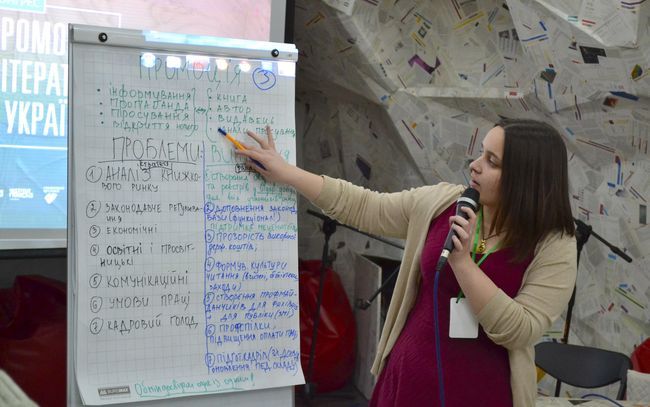Promotion of literature in Ukraine: challenges
Oleksandra KOVAL: “We will compete when we have 40 million readers”
“All civilized nations have reading promotion programs, which take into account the country’s inner peculiarities and specific problems. If in the US the problem is related to education, their program is primarily based on education. If Poland decided that this problem is mainly related to libraries, their current program is focused on the modernization, reorganization, and filling of the libraries. But what should a country like ours do?” This almost rhetorical question was put by Oleksandra Koval, president of the civil association Publishers’ Forum, at the congress “Promotion of Literature in Ukraine,” which was recently held in Kyiv. Another civil association, Ukrainian Literary Center (led by the literary projects curator Polina Horodyska), assembled the organizers of the major literary events, as well as representatives of international cultural institutions, literary managers, and other culture figures from all over Ukraine, in order to get an idea of the current developments in literature and of the most burning problems and issues in this sphere. The topics discussed included Ukraine’s participation in the program “Creative Europe,” the intellectual book, the book market, and the reading promotion program.
Of course, it is impossible to discuss the promotion of literature without the book market as such. Koval presented her own reading promotion program. According to her, in the recent decade the rate of publishing hovers around one per capita, which is two to four times less than in Europe (depending on the country). And given the current economic situation, even this meager figure can drop by 60 percent, warns the forecast of the Ukrainian Publishers and Booksellers Association. What does Koval suggest? First of all, increase education standards: it is educated individuals with well-developed critical thinking that set the demand for books, including the “vogue” for highbrow publications. The process of increasing education standards is inseparably linked with the reorganization of libraries, which “urgently need new publications instead of the tomes printed in the 1970s,” as the president of the Publishers’ Forum put it.
The situation with domestic libraries and their transformation is a separate topic for discussion: with the advent of the Internet, lack of innovation in Ukrainian libraries is gradually turning them into rudimentary archives. So, Koval presented a very basic, outline “how-to,” from continual communication and mapping the literary landscape of every community to persuading the President, Verkhovna Rada, and Cabinet of Ministers to adopt and finance a long-term reading promotion program. However, it would be naive to count on state support, especially in today’s conditions: the Publishers’ Forum has been petitioning consecutive Ukrainian governments and presidents about its reading promotion program since 2005, but unfortunately, in our country culture is financed on the leftover basis.
However, if domestic resources are hard to obtain, there is still chance for European support. Ukraine could participate in the program called “Creative Europe,” which provides grants to support European cooperation projects, promote artists and artistic sites, and literary translations of foreign authors. Now the initiative “Creative Ukraine” is in development phase, said Mykola Skyba, director of the Cultural Initiatives Agency and member of the task force “Culture-2025. Strategic Initiatives Platform.” The European program is meant to last till 2020, so if Ukraine becomes a participant (and by the way, it gets a sort of “privilege ticket” for this grant project, the admittance will cost a symbolic 1 euro), that will give domestic creative industry a chance for development.
International cooperation was also discussed by the representatives of the Polish Institute, Goethe-Institut, the Czech Centre, the British Council, and the French Institute during the roundtable titled “International projects in literature. Experiences of promotion.” Speakers shared their know-how with literary managers: the involvement of renowned Ukrainian authors helps to promote translated literature considerably. For instance, thanks to Oksana Zabuzhko, our book amateurs got acquainted with Katerina Tuckova, a newly-risen literary star of East-Central Europe. Yurii Andrukhovych’s name on the cover of translations from Bruno Schultz (published by A-BA-BA-HA-LA-MA-HA) increased the audience’s interest in the book.
There has appeared a new tendency in promotion of literature: a synthesis of arts and new project formats. The participants of the congress mentioned several positive (moreover, implemented) examples of this phenomenon, where different audiences are brought together on one artistic site: GogolFest, International Literary Festival Intermezzo, or the Book Arsenal. Another progressive method is the use of multimedia in promotion. This can be seen in a new literary project “Yizdets” [the name can be loosely translated as “traveler.” – Ed.], which was presented at the congress. It is a tourist guide and a collection of short stories at the same time, with an exclusive photo series for each city. The project will have two forms, paper and an interactive Internet version, and will be published every six months, says founder Halyna Tanai.
All in all, 50 active participants of literary process visited the congress to share their own experience of literary management and related lifehacks. Chief editors and initiators of the project “Chytomo” Iryna Baturevych and Oksana Khmeliovska told that opening a store on their website doubled the traffic. Mariana Maksymiak shared her experience of creating cultural events for a little town on the example of “Art-Dvir,” a project from Buchach. By the way, regional initiatives are becoming increasingly popular in literary circles. Liudmyla Fit, leader of the youth civil organization “Book Maestro” (Cherkasy), told that young male authors enjoy the best “demand” in this city, due to a sizeable female audience. Well, any means to an end of promoting literature.
Interestingly, all the participants agreed that trust and reliability of the partner is the most important thing in literary process. As Koval said, “We will compete when we have 40 million festival-goers and readers. Now, let us support each other.”






